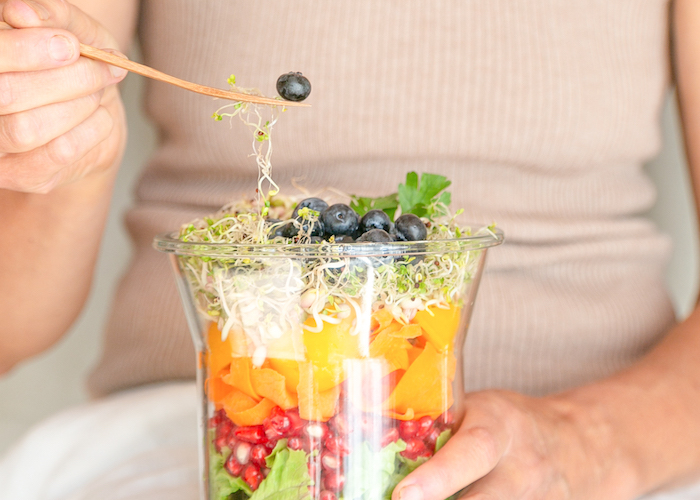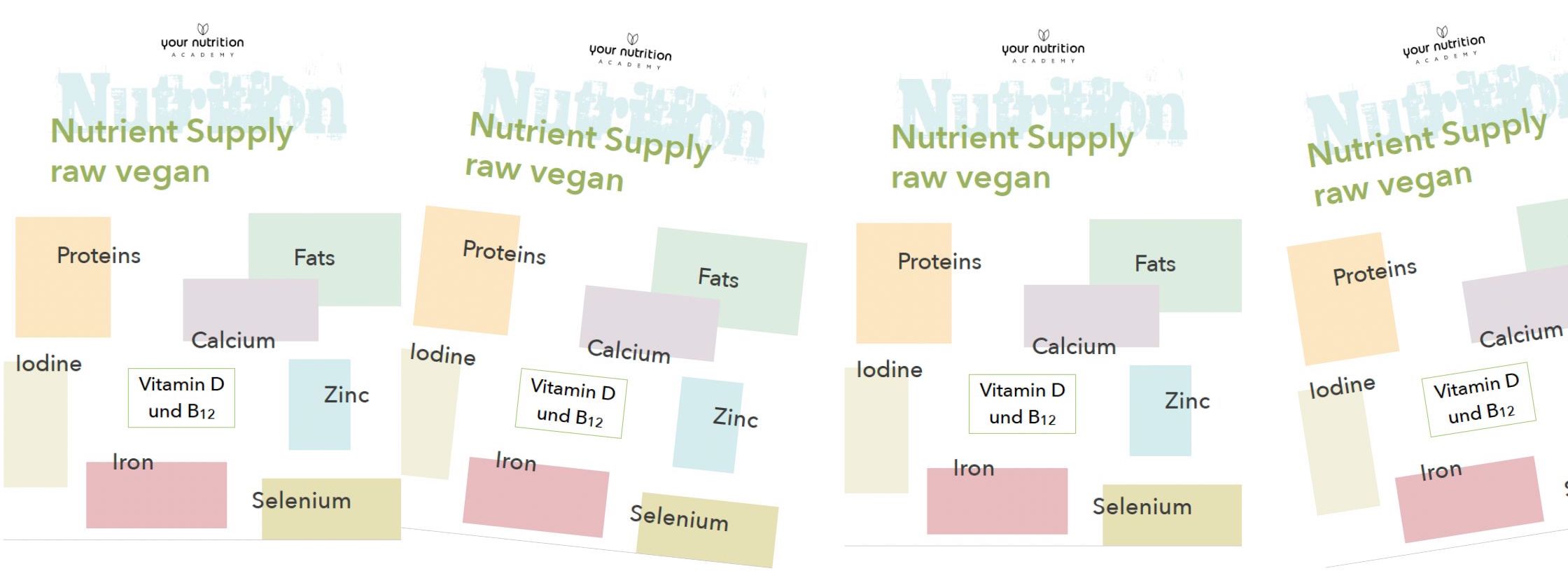A balanced diet is an essential key to a healthy life. More and more people these days are turning to dietary supplements to ensure that they receive all the necessary nutrients. Is this really necessary?
In this article, we’ll examine whether it’s possible to cover all nutrients needed naturally with a largely plant-based diet and whether it makes sense to avoid dietary supplements.
CONTENTS
- Classification Into Macro and Micronutrients
- Development of Dietary Supplements
- Quality of Dietary Supplements
- Challenges When Taking Dietary Supplements
- Optimal Nutrient Supply With a Plant-Based Diet
- Relying on Natural Nutrient Boosters
- Additional Benefits of a Plant-Based Diet
- When are Dietary Supplements Useful?
- Nutrient-Rich Snack
- Conclusion
Classification Into Macro and Micronutrients
Historically, the idea that our food consists of individual nutrients has only existed since the beginning of the 19th century. Initially, the substances in food were divided into macronutrients. It was only around 150 years ago that micronutrients were discovered.
Macronutrients
Macronutrients include carbohydrates, fats and proteins. Our bodies need them in relatively large quantities and serve either as energy suppliers or as building blocks for tissue and auxiliary substances such as enzymes, hormones and antibodies.
Micronutrients
In contrast, micronutrients are needed by the body in small quantities, but they fulfill numerous important regulatory functions. These include minerals, vitamins, trace elements and secondary plant substances.
The Development of Nutritional Supplements
With increasing awareness of nutrients, the idea of supplementing the diet with additional nutrients arose. This led to the development of a separate industry that focuses on the production of nutritional supplements.
The idea of modern nutritional supplements first took hold in the 1920s with the discovery and isolation of vitamins. The first vitamin preparations were introduced in the 1930s, and in the 1950s and 60s these expanded to include minerals and herbs. Since the 1980s, the industry has experienced strong growth and now offers a wide range of specialized supplements.
Quality of Dietary Supplements
Dietary supplements contain vitamins, minerals and other nutrients that are extracted from plant or animal sources or produced synthetically. They’re offered in concentrated forms as tablets, capsules, powder or other dosage means. They’re required to be labeled as dietary supplements and are available in pharmacies, drugstores and supermarkets.
Studies have shown that high-dose mono-preparations often only alleviate symptoms without correcting the underlying deficiencies and can cause new symptoms in the process (1). This is because the important synergistic effects of the many different nutrients in high-quality foods (organic, wild-harvested, home-grown) are missing in mono-substances.
A key difference is whether dietary supplements are based on synthetic substances (mono-substances) or on natural substances. High-quality dietary supplements contain whole foods or natural products in their entirety. Good manufacturers do not rely on isolated individual substances, but use whole natural products and combine them with other natural ingredients. One example is high-quality B vitamin products, which cover the entire B vitamin range through certain types of algae.
Challenges When Taking Dietary Supplements
Although dietary supplements seem attractive, there are some challenges and risks. Taking nutrients in isolation can disrupt the natural synergy in the body and cause undesirable interactions, such as between zinc and copper, where an excess of zinc can impair the absorption of copper.
Natural physical synergy
The example of taking high doses of vitamin D illustrates this
Among other things, vitamin D has a crucial function for bone health. When we consume calcium with food, vitamin D supports the absorption of calcium into the blood via the intestinal mucosa. Vitamin K2, which is formed in the intestine when the intestinal flora is healthy, ensures that the absorbed calcium gets from the blood to its destination, such as bones or teeth.
What happens in the body when you take vitamin D?
Vitamin D ensures that calcium is absorbed from the intestines into the blood. However, if the diet contains too little calcium in accordance with the vitamin D dosage, vitamin D supplementation can trigger calcium to be removed from the bones and thus promote osteoporosis, which is what we’re trying to prevent in the first place.
In addition, appropriate vitamin K2 supplementation is necessary because the activated calcium otherwise settles in unfavorable places and can lead to calcification in blood vessels, organs and tissue. Magnesium also plays an important role in this interaction. Magnesium is responsible for keeping calcium out of the cells of the soft tissue.
So what happens if the ratio between vitamin D and K2, calcium and magnesium is not optimal? Or how can the correct dosage be determined, which should ultimately be tailored to each individual’s metabolism?
This example clearly shows the challenges and potential risks of long-term or high-dose dietary supplementation. We still know very little about the long-term effects of taking high doses of vitamin D.
Interactions between different nutrients
When taking supplements, it’s also important to be aware of possible interactions between different nutrients. Here are some of the most common and significant interactions:
Copper and zinc
High doses of zinc can reduce copper absorption in the gut, which can lead to a deficiency. It’s advisable to keep an eye on the ratio of both nutrients.
Iron and calcium
Calcium can inhibit iron absorption. These supplements should be taken at different times.
Magnesium and calcium
Excessive amounts of one of these minerals can interfere with the absorption of the other. A balanced ratio is important.
Vitamin K and vitamin E
High doses of vitamin E can interfere with the action of vitamin K, which is important for blood clotting.
Vitamin D and magnesium
Vitamin D increases magnesium requirements because magnesium is needed to activate it.
Folic acid and vitamin B12
High folic acid intake can mask a vitamin B12 deficiency, so both vitamins should be kept in balance.

Optimal Nutrient Supply With a Plant-Based Diet
Nowadays we often hear that modern farming methods, depleted soils and a stressful lifestyle mean that optimal nutrient supply through diet alone is hardly possible anymore. Given the complexity and potential risks associated with taking nutritional supplements, however, we recommend making full use of the nutritional potential of a plant-based diet before resorting to additional supplements.
If you’re well informed, you can achieve optimal nutrient supply with a varied plant-based diet. Plant-based foods are extremely rich in nutrients and practices such as activating seeds and nuts and combining foods correctly can further optimize nutrient density and availability.
Fresh plant-based foods in particular contain plenty of vitamins, minerals, secondary plant substances, enzymes, fiber and biophotons in a naturally active ingredient complex! The supply of vitamin B9 (folic acid), C and E, beta carotene and magnesium is particularly good.
Vegans should pay particular attention to these nutrients
The German Nutrition Society (DGE) classifies the supply of the nutrients calcium, iron, iodine, selenium, zinc, omega-3 fatty acids, proteins, vitamin D and vitamin B12 as potentially critical in the context of a purely plant-based diet. However, all of these nutrients can be balanced very well with the right background knowledge. Vitamins B12 and D require special attention.
If you would like to find out more about the importance of these nutrients for our health and in which plant-based foods they’re found in abundance, download our e-book here:
>> The Nutrient Checklist
Relying on Natural Nutrient Boosters
If we start the day with fresh pressed juices and supplement our meals with wild herbs and sprouts, we can significantly increase the nutrient density and at the same time create a balance for nutrient-poor cultivated vegetables.
Fresh pressed juices
A large part of the energy we get from food is used by our bodies for digestive work and separating the active ingredients from the fibers. By pressing fresh green leaves, vegetables or fruits, the cell walls of plant fibers are broken down, fibers are sorted out as pomace and the remaining juice contains large amounts of vitamins, minerals, enzymes and secondary plant substances. When consumed on an empty stomach, the nutrients can usually be absorbed by our bodies within a few minutes.
You can find everything about fresh pressed juices here: Fresh pressed juices
Wild herbs
Wild herbs such as nettle, ground elder, dandelion, chickweed and the like have a unique variety of nutrients and their vitamin and mineral content is significantly higher than that of cultivated vegetables (2). Nettle, for example, contains 7 times more iron, 15 times more calcium, 25 times more vitamin C and 6.5 times more magnesium than lettuce.
How can this be explained? Wild plants grow on largely untouched soils that are home to many small creatures, earthworms and microorganisms. While cultivated vegetables are tended and cared for by us, wild herbs find their own place in nature and assert themselves vigorously. In addition to valuable vitamins and minerals, they also develop a variety of secondary plant substances.
Wild herbs are rich in:
- Biophotons
- Chlorophyll
- Bitter substances
- Enzymes
- Minerals, vitamins, protein
- Secondary plant substances
Sprouts
While vegetables and salads often come from greenhouses, are transported halfway around the world and are relatively expensive, sprouts grow on your own windowsill and can be cheap, fresh and alive when they end up on our plates.
- Activating the seeds leads to extensive biochemical processes and makes sprouts one of the most nutrient-rich foods of all.
- Enzyme activity increases.
- Proteins are broken down into amino acids and can thus be better absorbed (3).
- The presence of essential fatty acids increases.
- Complex carbohydrates (starch) are broken down into monosaccharides and disaccharides(4).
- Antioxidants increase (5).
- Vitamin content increases and the vitamins form a bond with enzymes, which means they can be better absorbed by the body. Vitamins A, C, E and the important B vitamins (6) increase many times over, and in some varieties vitamin C increases by 600%.
You can find everything you need to know about growing sprouts here: Growing your own sprouts opens up unimagined possibilities
Additional benefits of a plant-based diet
Ingredients from animal products that are considered problematic for health reasons are not found in plant-based foods. Plant-based foods contain hardly any saturated fatty acids, no cholesterol and no purines, but plenty of fiber and secondary plant substances. Numerous studies show that people who eat a lot of plant-based foods have a reduced risk of numerous diet-related diseases such as type 2 diabetes, high blood pressure and cardiovascular diseases(7).
With a diet that has a high proportion of fresh foods, the disadvantages of heavily processed vegan products, such as white flour, sugar, too much salt, hydrogenated and/or omega-6-rich fats, are also eliminated.
When are dietary supplements useful?
Despite all the risks and concerns, there are various life circumstances in which taking dietary supplements may be necessary and can include the following cases.
Specific deficiencies
If a deficiency in certain nutrients is proven, temporary supplementation may be useful to compensate for the deficiency.
Special phases of life
In some phases of life, such as during pregnancy or breastfeeding, during growth phases or in the case of certain illnesses, the need for nutrients may be increased. In these cases, taking dietary supplements may be recommended to cover the need for important nutrients.
Specific nutrients
In certain cases, checking vitamin D and B12 status and possibly supplementing may be useful. There is an increased risk of vitamin D deficiency in particular in people with little sun exposure. Vegans, vegetarians and people with digestive disorders are at a higher risk of vitamin B12 deficiency and should therefore check their vitamin B status regularly, as a long-term vitamin B12 deficiency can lead to irreversible nerve damage.
Nutrient-rich snack
Would you like to get to know the nutritional richness of poppy and sesame seeds? Then these delicious poppy and sesame snails are just right for you!
Conclusion
In summary, it can be said that a plant-based diet offers us all the options for an optimal supply of nutrients. Through variety and the correct preparation of fresh plant-based foods such as fruits, vegetables, legumes, nuts and seeds and the addition of fresh pressed juices, wild herbs and sprouts, basically all nutrients can be absorbed naturally. Vitamin D is an exception and special attention should be paid to vitamin B12.
The convincing argument for a predominantly plant-based diet is the fact that the nutrients in plant-based foods are contained in a natural complex of active ingredients, meaning we hardly run the risk of incorrect dosage.
However, we should not ban food supplements entirely. In certain phases of life or in the case of health problems, it can make sense to temporarily compensate for nutrient deficiencies with food supplements.
Would you like to join our unique program, based on nutritional sciences and practice-oriented training for gaining a high level of health?
We’re more than happy to inform you about all that our training program offers on our website!









0 Comments